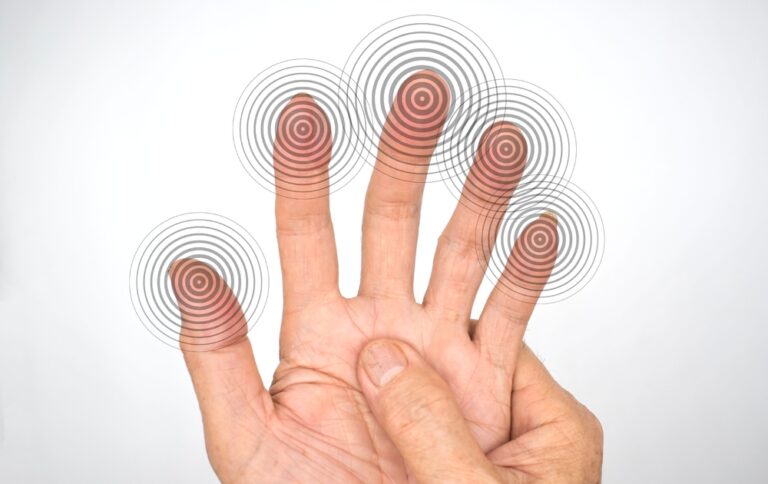Neuropathy occurs when the peripheral nerves are damaged. These nerves help connect your nervous system to different parts of your body. When they stop working properly, your brain has trouble communicating with your muscles, skin, or internal organs. This can lead to pain, weak muscles, and numbness in your hands or feet.
There is not just one reason for neuropathy. It can come from injuries, not getting enough of certain foods, diabetes, infections, or coming into contact with harmful things. When treating neuropathy, the first step is to determine the cause and its impact on your life.
In most cases, neuropathy can be effectively treated, especially when help is sought early. Understanding the symptoms and learning how nerve-related conditions function can help prevent long-term problems and manage them effectively.
Major Causes of Neuropathy
What causes neuropathy? The causes of peripheral neuropathy can be many, with diabetes being the most common. When blood sugar levels remain high for an extended period, it can damage nerves. This often turns into what is called diabetic neuropathy. Another main cause is getting hurt or having an accident that damages nerves.
There are other reasons people get neuropathy. Some people are exposed to toxins or drink alcohol for years. Some individuals develop it from autoimmune disorders, where the body mistakenly attacks itself. Not getting enough of important nutrients can also lead to this problem. To determine the best course of treatment, doctors seek to identify the underlying condition.
Diabetes and blood sugar issues
Diabetic neuropathy is the most common type of neuropathy. High blood sugar from diabetes hurts your nerve fibers and makes it hard for them to talk to the rest of the body. Over time, this leads to nerve damage and a loss of sensation. Most people feel this first in their feet and hands.
The problem also affects blood vessels. This reduces the blood flow to your peripheral nerves. As a result, you may experience a tingling or sharp pain that persists for an extended period. If you do not take care of it, diabetic neuropathy can bring bigger problems, such as infections and sores.
To help stop this type of neuropathy, watch your blood sugar. If you have diabetes, you need to check on your health often. Take care of your hands and feet every day. Pay close attention if you have new or strange feelings. Get help early to stop more nerve damage.
Physical injuries and trauma
Neuropathy sometimes begins with a nerve injury. Accidents, falls, or sports can hurt the spinal cord or the peripheral nerves right away. Doing the same action over and over, such as in carpal tunnel syndrome, can push on nerves and make you feel tingling or weak.
When trauma causes neuropathy, the symptoms typically appear in a specific area. For example, an injury to the wrist may cause problems with moving your hand. If the hurt spot is close to motor nerves, you may also see muscle weakness or have trouble with coordination.
You can lower your risk of nerve injury by wearing protective gear while playing sports or by using the right work tools for your body when you have a risky job. Getting help early and going for physical therapy can also reduce the problems caused by trauma-linked neuropathy.
Infections and autoimmune diseases
Neuropathy caused by infections begins when harmful bacteria or viruses damage nerve tissue. Diseases like Lyme disease and shingles can both lead to nerve damage. If you have a weakened immune system, you may be at a higher risk of developing this condition.
Neuropathy is also seen in people with autoimmune diseases. This includes rheumatoid arthritis and chronic inflammatory demyelinating polyneuropathy. In these cases, the body mistakenly attacks its nerves. This can be painful and last a long time.
To treat neuropathy caused by infections, people often use antibiotics and other medications. These help control how the immune system acts. Monitoring autoimmune diseases is also important. Regular checks help identify symptoms early, preventing them from worsening and causing further complications, such as peripheral nerve damage.
Exposure to toxins and medications
Being around heavy metals like mercury or lead, and other industrial toxins, can seriously hurt your peripheral nerve fibers. These things interfere with the nervous system and hinder its proper functioning over time.
Some medications, such as chemotherapy drugs, are also known to lead to peripheral nerve damage. These drugs treat cancer and other health problems, but they can bring on bad side effects, including tingling feelings or muscle weakness.
If toxins or certain medications cause your nerve trouble, you need to identify the cause and eliminate it. Be sure to discuss other options with your doctor and learn how to stay safe to prevent long-lasting nerve damage.
(The next sections will talk about causes, how to find out what is wrong, ways to prevent trouble, and treatment of neuropathy as planned). Are you ready to set up your visit? N8 Family Chiropractic is here to help you get expert advice about your nervous system health.
Vitamin deficiencies and poor nutrition
Nutritional imbalances can have a big effect on the nervous system. They can lead to peripheral neuropathy and damage nerve fibers. Lacking sufficient amounts of certain B vitamins, such as B1, B6, and B12, may lead to nerve damage, muscle weakness, and neuropathic pain. When you do not get these vitamins, it also weakens your immune system. This can make you more likely to get health issues like diabetic neuropathy. A diet lacking key nutrients can lead to loss of sensation and exacerbate symptoms. It demonstrates the importance of balanced nutrition in maintaining a healthy nervous system and preventing nerve damage from worsening.
Less Common Causes of Neuropathy
Idiopathic peripheral neuropathy means that the reason for the nerve problem is not known, even after doctors have done lots of tests. Some autoimmune diseases, such as rheumatoid arthritis and lupus, can also affect the nerves in the peripheral nervous system, causing significant problems. There are certain infections, such as Lyme disease, that can cause nerve damage. These infections may change the way electrical activity happens in the sensory nerves. Too much alcohol and being around heavy metals and other toxins can also lead to these peripheral nerve disorders. It is important to know about these not-so-common causes to manage peripheral neuropathy well and make the best use of healthcare for people.
Genetic and inherited neuropathies
Genetic and inherited neuropathies are a group of conditions that happen because of changes in certain genes. These changes can affect how peripheral nerves function and remain healthy. When nerve damage occurs, it can cause problems such as muscle weakness, loss of sensation, and neuropathic pain. Charcot-Marie-Tooth disease is one of the most known examples that shows how things you get from your parents can change your nerves and how they work. Understanding these genetic reasons is crucial. It helps doctors identify what is wrong, provide better care, and potentially develop new treatments for individuals with nerve damage, muscle weakness, or loss of sensation. Understanding this can improve the lives of people with issues affecting their peripheral nerves.
Cancer and its treatments
Cancer and the treatments used for it can cause different types of neuropathies. Chemotherapy is one treatment that can lead to peripheral nerve damage. This often brings loss of sensation and neuropathic pain. Radiation therapy might also harm the peripheral nervous system, depending on where you get the treatment. Due to this nerve damage, some individuals experience motor weakness and muscle atrophy. This can make a recovery and move around much harder. Understanding how cancer treatment can impact nerve health is crucial. It helps people and doctors manage these side effects and work to improve the lives of those going through these difficult conditions.
Chronic kidney or liver diseases
Chronic kidney or liver diseases can have a big effect on your nerve health. This can often lead to peripheral neuropathy. When these organs do not function properly, toxins accumulate in your blood. This build-up can harm your nerve fibers. You may notice symptoms of peripheral neuropathy, such as loss of sensation and muscle weakness in affected areas.
The immune system and nerve damage can work together to exacerbate symptoms or chronic pain. This can mean you feel more muscle weakness or loss of sensation. To prevent further problems and maintain your mental well-being, it is essential to recognize these issues early and manage them effectively. Good care can help protect your nerve fibers and reduce nerve damage and other symptoms of peripheral neuropathy.
Diagnostic Procedures for Neuropathy
A full diagnosis of neuropathy typically involves several steps to assess how the nerves function and appear. First, doctors take a detailed medical history and conduct physical exams to identify symptoms and any other potential health issues. Nerve conduction studies and electromyography (EMG) check the electrical activity of the peripheral nerves and measure muscle strength. Blood tests are used to detect vitamin deficiencies or autoimmune diseases that can affect the nervous system. Doctors may also use MRI or CT scans to examine the spinal cord and central nervous system. Sometimes, a nerve biopsy is necessary to examine the health of the nerve fibers. All of these tests help doctors identify the underlying cause of the neuropathy and its impact on the body.
Detailed medical history and physical exam
A thorough medical history is essential for determining the causes of neuropathy. The doctor will ask about your past health, your current habits, and any symptoms you are experiencing, such as muscle weakness or loss of sensation.
During the physical exam, healthcare professionals check how well your peripheral nervous system is working. They will assess your reflexes, strength, and sensitivity to touch. This test checks for nerve damage or problems with your nervous system. The doctor will also monitor your blood pressure and inquire about your overall health. All of this helps to understand what might be causing the neuropathy. These steps ensure you receive the right tests and treatment that fit your needs.
Nerve conduction studies and electromyography (EMG)
Nerve conduction studies (NCS) and electromyography (EMG) help doctors find out if you have nerve damage. NCS checks the electrical activity in the peripheral nerves. It examines how quickly your nerves transmit electrical signals. This test helps show problems like diabetic neuropathy or carpal tunnel syndrome. The EMG is different. It checks how your muscles react when getting signals from your nerves. This highlights any issues with the way nerves and muscles communicate with each other. When you use both tests together, they reveal the types of neuropathies affecting your sensory and motor nerves. These results help your doctor create an effective plan to alleviate neuropathic pain and enhance muscle strength.
Blood tests and laboratory screenings
Blood tests and laboratory screenings help doctors determine if someone has neuropathy. They identify medical conditions that can lead to nerve damage. These tests look at blood sugar, kidney function, and liver health. They can also indicate a deficiency in certain vitamins that may harm your nerves. The tests check markers to see if your immune system is attacking the body’s peripheral nerves—this can point to autoimmune diseases. Screenings can also look for heavy metals and illnesses like Lyme disease, which may be contributing factors to nerve problems. All these steps give doctors helpful information. This helps them choose the best way to treat neuropathic pain and other symptoms that come from these medical conditions.
Imaging studies (MRI, CT scans)
Imaging studies, such as MRI and CT scans, help doctors see inside the body. These tests help show details of the nervous system, spinal cord, peripheral nerves, and blood vessels. With these images, doctors can identify changes or problems that may be associated with a specific type of neuropathy. For example, an MRI can identify nerve compression or swelling, and a CT scan can reveal if blood vessels near the nerves have altered in shape.
By looking at these imaging results, healthcare providers get a better idea of which type of neuropathy you have. They can then create a treatment plan that will help alleviate your symptoms and improve your quality of life.
Nerve biopsy and other advanced tests
Advanced diagnostic tests are crucial in determining the type of neuropathy and its underlying causes. A nerve biopsy looks right at the nerve fibers. This can help identify nerve damage or problems that other tests may not detect. There will be more tests, such as electrodiagnostic studies. They measure the electrical activity in nerves and muscles. This helps to know how well the nerves and muscles work. Some new imaging tests can show issues with the nerve root or spinal cord. Using all these tests together gives a full picture of the person’s condition. It helps doctors select more effective treatments.
What to Expect During Your Diagnosis
Going through the steps to identify the issue can be a challenging process. But, knowing what will happen can make you feel less worried. Initially, your doctor will review your medical history. This helps to find out if there could be any problems causing neuropathic pain or muscle weakness.
During the visit, the doctor may ask about any changes in how you feel about things, if you have trouble with balance, and about activities you engage in during your daily life. They may talk about alcohol use or ongoing health problems. After this, your doctor might want you to do certain tests. These can be blood tests or nerve conduction studies. These tests help find out the type of neuropathy you may have in your peripheral nerves. It is good to be ready and talk openly with your doctor about what you feel.
Preparing for your appointment
Getting ready for your appointment can really help your doctor find out what is causing your neuropathy. Start by making a list of your medical history. Be sure to include any muscle weakness or methods you use for pain relief. Try to notice any patterns in your symptoms, such as loss of sensation or changes in your balance. This can be important for the doctor. Bring a list of all medicines you take, even the ones you get without a prescription or any supplements, because things like vitamin shortages might matter. Additionally, you should record details about your daily life, such as the amount of alcohol you consume or your eating habits. This will provide the doctor with useful information to assist with your checkup.
Next steps after diagnosis
After you get a neuropathy diagnosis, there are a few key steps you should take to help manage your condition. Work with your healthcare team, including a chiropractic clinic like N8 Family Chiropractic, to create a plan that meets your needs. This plan may include chiropractic care or methods to alleviate pain. If you have diabetes or autoimmune diseases, it is very important to keep an eye on those. Doing so can help stop neuropathy from getting worse. Simple changes in your life, such as eating healthier foods and engaging in more exercise, can strengthen your health. You should also go to regular checkups. Be sure to discuss any new or different symptoms you are experiencing. This helps your care team help you. Some people find that support groups give them comfort and make them stronger in dealing with neuropathy.
Final Thoughts
It is essential to understand neuropathy to effectively manage and treat it. There are many reasons for this condition. It can be caused by factors such as insufficient vitamin intake or less common problems, including autoimmune diseases and infections. With the right steps, which may include blood tests and nerve studies, doctors can determine the underlying cause of the problem. This helps them choose treatments that may alleviate symptoms and improve a person’s quality of life. Finding signs early and getting medical help in time can lead to better results for people who have neuropathy.




